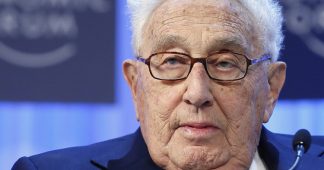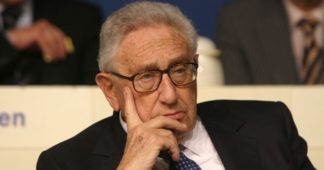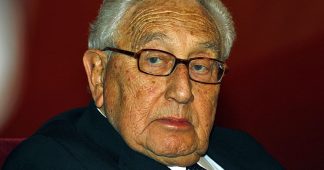By William Mallinson*
Can I do this?
As the author of a recent book on Heinz Kissinger (the result of over twenty years of archival research), and how he bamboozled Greece, and even Britain, over the invasion of Cyprus,
I am surprised at the mainstream media’s eulogising one of the most cynical armchair executioners the world has ever known. We must put the record straight.
But first, herewith two nauseating examples of this eulogising: former British Prime Minister Tony Blair, surely a war criminal by any ethical standards, described Kissinger as an artist of diplomacy, who was motivated by ‘a genuine love of the free world and the need to protect it’. And this from the man who engineered the illegal attack in Iraq, after supporting the dodgy dossier about weapons of mass destruction, resulting in the death of hundreds of thousands of civilians. Another former British Prime Minister, Boris Johnson, called Kissinger ‘a giant of diplomacy and strategy – and peace-making’. This from the man who, on American instructions, ordered Zelenski to tear up the peace agreement with Russia, carefully put together by Turkey, leading to the near destruction of Ukraine, which continues as I write. My only comment about these people is that mud attracts mud.
How Kissinger can be described as a giant of diplomacy is bizarre, since he never trained as a diplomat. His book Diplomacy is a travesty of real diplomacy, and more of an account of high-level wheeler-dealing, for starry-eyed students of international relations. For anyone interested in real diplomacy, he should turn to Harold Nicolson’s book, also called, but aptly, Diplomacy.
Before we get down to some real archive-based factuality, let us recall that some years ago Kissinger had to skedaddle out of France, to avoid being questioned by the police about the death of some French citizens in Pinochet’s Chile. Then we have Kissinger’s secret bombing of neutral Cambodia, in which hundreds of thousands of civilians were bombed to death, on the palpably lame excuse that the Vietnamese army was operating from the country. Altogether, the US dropped more than two million tons of bombs on Cambodia between 1965 and 1973. To put matters into context, the Allies dropped just over two million tons of bombs during the whole of World War II, including the bombs that struck Hiroshima and Nagasaki. Perversely, not long before the US was kicked out of Vietnam, Kissinger was awarded, and accepted, the Nobel Peace Prize. The more gentlemanly Vietnamese leader, Le Duc, refused to accept it, while two members of the Nobel committee resigned in disgust.
Years before, Kissinger had risen to public prominence with his book Nuclear Weapons and Foreign Policy, in which he controversially advocated limited nuclear war, then being hired by Nelson Rockefeller. This worried, for one, the British Foreign Office, which commented: ‘He argues that a policy of limited war would certainly be advantageous to the west. But this is doubtful. Dr. Kissinger’s attack on the United States for relying solely upon H bombs is rather out of date. He assumes perhaps too easily the possibility of keeping “peripheral” wars limited. The adoption of a theory of limited war in Europe might destroy the efficacy of the deterrent. It might also damage NATO morale.’
Let us now look more closely at what Kissinger’s apologists say, at Cyprus, and then at what serious diplomats really thought of Kissinger.
The Apologists
The most recent well-known hagiography is Niall Ferguson’s Kissinger: 1923-1968: The Idealist, which manages to paint a positive picture, via a combination of whitewashing and omission, with the absurd claim that Kissinger was an idealist. Ferguson was evidently blissfully unaware that Kissinger had almost singlehandedly helped to revive the term ‘geopolitics’, by using it as a synonym for balance-of-power politics. Geopolitics, let us recall, was a 19th century imperialistic doctrine used to justify strong countries grabbing weaker countries’ resources, and imposing business borders on newly created states, that bore little relationship to natural demography. Perhaps the most famous exponent was Haushofer, who was admired by the Nazis, who used his doctrine to justify Germany’s territorial expansion. Yet here was Kissinger, obsessed with the power of states, bringing it back, so that today politicians use the term randomly and uncritically to disguise all manner of illegal wars. In a recent article, Ferguson dismisses criticism of Kissinger’s well-proven rôle in the Allende’s downfall and Pinochet’s subsequent dictatorship with the opinionated words: ‘One thing is very clear on the basis of the most recent scholarship [what ‘scholarship’?]. The fall of Allende in 1973 was primarily an achievement of his domestic opponents in the Chilean congress and military.’;
Ferguson thereby distracts attention from Kissinger’s well-proven malevolent machinations. Perhaps one of his most crassly sophistic but cynical statements is: ‘The amount of ink spilled by Kissinger’s critics over undoubtedly tragic events in Bangladesh, Cambodia, Chile or East Timor is out of all proportion to their strategic significance in the Cold War context.’ But he does not choose to explain why their alleged ‘strategic significance’ justified the killing of hundreds of thousands of innocent civilians.[1] Although, like Kissinger, he has gone into lucrative business consultancy, he has not yet become Secretary of State, despite his Republican credentials.
Let us now briefly look at the – perhaps less well known than Ferguson – ‘Cyprus apologists’. They have weighed in by countering the idea that Kissinger played the rôle of a subtle facilitator in Turkey’s invasion plans. One even writes, apparently oblivious to the archival evidence, that ‘there had been no communication between him [Kissinger] and Callaghan, [Britain’s Foreign Secretary at the time] that day [20 July 1974]’.[2] Yet the Secretary to the Cabinet wrote that ‘between 1445 and 0700 [on 20 July] the Secretary of State for Foreign and Commonwealth Affairs spoke twice to Dr Kissinger’.[3] It is to Cyprus that we need to turn to look at the real nitty gritty of Kissinger’s cynical tactics.
Cyprus as Kissinger’s Geopolitical Cannon-fodder
In 1957, in Nuclear Weapons and Foreign Policy, Kissinger described Cyprus as a ‘staging area’ for the Middle East. From then until 1960, the US, which after the Suez debâcle, had taken the lead in the Middle East, pressurised Britain into agreeing to grant Cyprus independence, while retaining its military and spying bases on the island. The Cold War warrior par excellence never veered from his obsession with Cyprus, an obsession that would entail his allowing Turkey to invade and occupy the island, resulting in the biggest ethnic cleansing operation since Israel kicked out 750, 000 Palestinians. Let us simply record a few instances of Kissinger’s methodology. All are backed up by official British government documents, some released following pressure on the Foreign and Commonwealth Office by the Information Commissioner and myself. Extrapolating from my books, we can state the following.
First, when the coup against President Makarios of Cyprus took place, Kissinger told the British Foreign Minister, Callaghan, that he wished to ‘avoid legitimizing the new regime in Cyprus’ for as long as possible, while not denouncing it immediately’.[4]
Second, he did not wish ‘to precipitate the downfall of the de facto situation [sic] in Cyprus’ (i.e. the putschist regime).[5]
Third, he questioned Britain’s moving quickly to support Makarios.
Fourth, he questioned Britain’s wish to apply pressure on the Greek junta to withdraw their officers from Cyprus thus giving Turkey the excuse it needed to intervene.
Fifth, he speciously using communism as an excuse to delay supporting international law.
Sixth, he refused to support Britain’s military obligations in Cyprus following the anti-Makarios coup.
Seventh, he illogically stated that pressure to restore Makarios would strengthen the Athens Junta, when the opposite was true.
Eighth, he refused to have a NATO ministerial meeting while Turkey was attacking.
Ninth, he suggested to Callaghan on 20 July, just after Turkey was ‘cutting loose’, that one sit on ‘the thing’ (the invasion) for a day.
Tenth, he had instructed Tasca (his envoy) to tell the Greek government that if they attacked Turkey and announced enosis, the US would immediately cut off military aid. Yet despite the Turkish invasion, he then fought tooth and nail against Congress to keep Turkey supplied with American arms. This was simply double-track diplomacy at best, or two-faced, at worst.
Eleventh, according to a British Athens embassy official in Athens, the Greeks believed that the Americans had convinced them that the coup was acceptable to them, and that Turkey would not invade Cyprus.
Twelfth, during the negotiations, Kissinger avoided seeing the new Greek Foreign Minister, Mavros, until ‘after the Geneva negotiations were over’. Obviously, a visit would have bedevilled Turkey’s invasion plan.
Thirteenth, when, at the Geneva negotiations, Kissinger’s advisers urged him to cut off military assistance to Turkey, he said that on no account must this be done, adding that he was not prepared to jeopardise the American position with Turkey.
Fourteenth, the British knew very well that the US would not prevent a Turkish invasion: on 14 August, the day of the big Turkish breakout, the British Ambassador in Washington wrote that while the Turks could not justifiably claim to have American approval for their position, particularly now that they have started fighting again, they could reasonably gamble that American disapproval would not be so forceful as to compel them to stop.[6]
Fifteenth, when Britain tried to give up its bases, Kissinger pressurised Britain not to do so, saying that Cyprus, an important part of the world chessboard, was important in the Arab/Israel dispute.
Sixteenth, Kissinger claimed that the Greeks had rejected the Turkish five/six canton proposal at Geneva, when in fact, Clerides, the Greek Cypriot negotiator, had asked for thirty six hours to consider the proposal[7]. Rather than give him the time, Turkey simply consolidated its invasion. Worse, Kissinger refuted Makarios’ claim that the US could persuade Turkey to accept a multi-regional solution. Despite what Kissinger has written, British documents confirm that it was in fact the Americans themselves who had ‘fed the Turkish delegation with the cantonal idea’.
The overall impression gained from juxtaposing Kissinger’s account and rationalisation with various documents is one betraying an express lack of specificity on his part, tactical omission, tactical and strategic procrastination, contradictoriness of argumentation, studied vagueness, occasional contrived humour, semantic sliding, and a personal attitude towards those who disagree with him, such as Makarios. His handling of the Cyprus crisis betrays his overall approach to world affairs.
As for his obsession with Cyprus, the documents also show that he pressurised Britain into not giving up her bases after the invasion. He also instigated the abortive Annan idea with his so-called ‘Five Principles Initiative’ just before he fell from power.
To round off this brief article, it is interesting to see what senior British, French and American diplomats thought about Kissinger:
‘I consider some of the views he expounded, though not completely irrational, both naïve and romantic.[8]
I felt that Frank [German State Secretary] regarded Kissinger with considerable misgivings. He thought he was far more in the mould of Metternich than a man with a full understanding of the inter-dependence of a modern world. Frank clearly feared that this 19th century approach was affecting White House thinking and perhaps the attitude of the President in particular. As you also know, we share Frank’s misgivings about the role of Dr Kissinger.[9]
If to be romantic is to admire great men who by cynical and ruthless action changed the course of history, then he is a romantic. He is also a romantic in the sense of seeing himself hopefully cutting as brilliant and successful a figure as those whom he admires. But it is quite clear for example from what we hear of his remarks in private that he enjoys making a cynical analysis of other people’s capacities and motives, and is introspective and aware of the fact that he may have an incipient folie de grandeur.[10]During the weekend when President Pompidou was at Chequers, the subject of Dr. Kissinger came up in the course of a conversation which I had with Jobert [French Foreign Minister]. It was clear that the French found his style and activities extremely distasteful. Jobert said that Kissinger was a “show-off” man.[11]
The relative disregard of important expertise from the State Department had gone too far. Hyland, whose parent organisation was CIA, believes that Kissinger is needlessly depriving himself of the services of true professionals in the art of diplomacy and policy formulation.[12]
A lot of the trouble we have run into must be attributed to Kissinger’s highly idiosyncratic way of doing business […] what I find difficult to judge is where the President ends and Kissinger begins.[13]
I was a bit disturbed by Dr. Kissinger’s apparent difficulty in comprehending the procedures of the Community.[14]
It is rather his manner of conceiving and conducting foreign policy without reference to, or knowledge of, the State Department or anyone else which is most worrying. It leaves one with the fear that any day something could go seriously wrong because the normal sources of advice, restraint and execution are by-passed.’[15]
To conclude
Whether Ferguson has simply expressly ignored the vital British archives from which the above comments are extrapolated, or whether he is genuinely ignorant of them, is a moot point. But given that the above comments were made by astute and well-trained diplomats, they render the (politically, emotionally and financially motivated?) apologists’ views mildly farcical.
I introduced this article by asking whether I can do this. All I wished to do was to help serious politically dispassionate researchers and real historians to see the importance of the individual human factor in inter-state relations, via archives rather than only theory and political emotion.
* Author of a) Cyprus: A Modern History, Cyprus, b) Diplomatic History and the Clash of Theory in International Relations, c) Partition through Foreign Aggression, d) Kissinger and the Invasion of Cyprus: Diplomacy in the Eastern Mediterranean and e) Guicciardini, Geopolitics and Geohistory: Understanding Inter-State Relations.
Athens, 8 December 2023
[1] Ferguson, Niall, Daily Mail, 30 November 2023.
[2] Asmussen, Jan, Cyprus at War: Diplomacy and Conflict during the1974 Crisis, I. B. Tauris, London and New York, 2008, p. 9. It is also worth mentioning that Asmussen was teaching in northern Cyprus, at ‘Eastern Mediterranean University’ in Famagusta.
[3] BNA-CAB/129/178.
[4] FCO to Washington, 16 July 1974, PRO FCO 9/1891, file WSC 1/10, pt. B, telegram no.
1538.
[5] Ramsbotham, British Embassy, Washington, to FCO, 20 July 1974, telegram, BNA- 9/1985, file WSC1/10, part F.
[6] Ramsbotham to FCO, 14 August 1974, telegram, BNA-FCO9/1947, file WSC 3/304/2.
[7] British Policy on Cyprus, July to September 1974’, paragraph 11, BNA-FCO 9/2379, file WSC 020/548/1.
[8] Freeman to Greenhill, 6 June 1970, letter, BNA-FCO 73/131.
[9] Jackling to Wiggin, 8 December 1971, letter, BNA-FCO 82/63, file AMU 3/548/10.
[10] Cable to Acland, 31 July 1973, minute, PREM 15/1983.
[11] Armstrong to Greenhill, 20 March 1972, letter, BNA-PREM 15/1272.
[12] Mackintosh, undated (probably late September 1972), report, BNA-FCO 82/197, file AMU 3/548/15.
[13] Sykes to Brimelow, letter, 22 August 1973, BNA-FCO 82/286, file AMU 3/507/1, part F.
[14] Overton to Hankey, letter, undated, but received in registry on 1 October 1973, BNA-FCO/304, file AMU 3/548/9.
[15] Op. cit., Jackling to Wiggin, 30 December 1971, letter.
Also read A nation betrayed
We remind our readers that publication of articles on our site does not mean that we agree with what is written. Our policy is to publish anything which we consider of interest, so as to assist our readers in forming their opinions. Sometimes we even publish articles with which we totally disagree, since we believe it is important for our readers to be informed on as wide a spectrum of views as possible.








